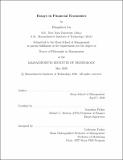| dc.contributor.advisor | Jonathan Parker. | en_US |
| dc.contributor.author | Lu, Fangzhou,Ph. D.Massachusetts Institute of Technology. | en_US |
| dc.contributor.other | Sloan School of Management. | en_US |
| dc.date.accessioned | 2020-09-03T16:46:56Z | |
| dc.date.available | 2020-09-03T16:46:56Z | |
| dc.date.copyright | 2020 | en_US |
| dc.date.issued | 2020 | en_US |
| dc.identifier.uri | https://hdl.handle.net/1721.1/126979 | |
| dc.description | Thesis: Ph. D., Massachusetts Institute of Technology, Sloan School of Management, May, 2020 | en_US |
| dc.description | Cataloged from PDF version of thesis. | en_US |
| dc.description | Includes bibliographical references. | en_US |
| dc.description.abstract | In Chapter 1, I document that there is a high correlation between the returns of cryptocurrencies and those of utility tokens, which are claims to products and services yet to be developed that are issued through ICOs and traded on crypto-exchanges. I demonstrate the presence of a numeraire effect in the pricing of these tokens and present evidence that it is driven by a combination of group thinking and representativeness bias. Investors mistakenly overestimate the probability that a cryptocurrency-denominated token is issued by a blockchain firm, and thus believe the fundamental value of the token is correlated with that of Bitcoin. I show that a 1% increase in the return on Bitcoin during the month before a token first lists on a crypto exchange predicts a 5% higher ICO return for a cryptocurrency-denominated token than for a fiat-currency-denominated token. | en_US |
| dc.description.abstract | If a token is denominated in a cryptocurrency on one exchange and its otherwise identical twin is denominated in a fiat currency on another exchange, then a 1% increase in the cryptocurrency return relative to the fiat currency predicts a 60 bp divergence in their prices. In Chapter 2, I show that consistent with being driven by a combination of group thinking and representativeness bias, the numeraire effect is more pronounced for tokens with more complex business plans. Moreover, experimental evidence corroborates these empirical findings and suggests that the numeraire effect is present in other asset prices as well and can explain home-currency bias. The combination of high volatility and numeraire effects undermines the ability of cryptocurrencies to serve as units of account. In Chapter 3, I demonstrate that debt owed to family and friends (DOFF) is a major component of household and entrepreneurial finance, particularly in developing countries. | en_US |
| dc.description.abstract | However, such informal finance carries with it an implicit covenant that can cause households to forgo durable-good consumption. This is because durablegood consumption can be perceived by the lender as a mis-use of funds and can result in social sanctions or debt recall. This paper uses China's Vehicle Scrappage Program (VSP) as a laboratory in which to study the causal link between DOFF and consumption. Merging survey data on Chinese household balance sheets with bid prices from China's online used-car markets, I find that DOFF on the balance sheet significantly reduces the probability that eligible households participate in the VSP and trade in their clunkers for new cars. Further, I find that this negative effect of DOFF on consumption is significantly mitigated by the presence of formal features such as a written contract, pre-determined debt repayment schedule, or positive interest rate. | en_US |
| dc.description.abstract | Together these results suggest that developing more formal channels for household finance can lead to increases in consumption. This is particularly important for developing countries such as China, where low consumption rates impede economic growth. | en_US |
| dc.description.statementofresponsibility | by Fangzhou Lu. | en_US |
| dc.description.tableofcontents | 1. Numeraire Effect in ICOs -- 2. Textual analysis and experimental evidence on cryptocurrencies trading behavior -- 3. Social Debt Overhang and Under-Consumption -- A. Appendix Tables -- B Appendix: Instructions to experiment participants. | en_US |
| dc.format.extent | 151 pages | en_US |
| dc.language.iso | eng | en_US |
| dc.publisher | Massachusetts Institute of Technology | en_US |
| dc.rights | MIT theses may be protected by copyright. Please reuse MIT thesis content according to the MIT Libraries Permissions Policy, which is available through the URL provided. | en_US |
| dc.rights.uri | http://dspace.mit.edu/handle/1721.1/7582 | en_US |
| dc.subject | Sloan School of Management. | en_US |
| dc.title | Essays in financial economics | en_US |
| dc.type | Thesis | en_US |
| dc.description.degree | Ph. D. | en_US |
| dc.contributor.department | Sloan School of Management | en_US |
| dc.identifier.oclc | 1191222258 | en_US |
| dc.description.collection | Ph.D. Massachusetts Institute of Technology, Sloan School of Management | en_US |
| dspace.imported | 2020-09-03T16:46:55Z | en_US |
| mit.thesis.degree | Doctoral | en_US |
| mit.thesis.department | Sloan | en_US |
